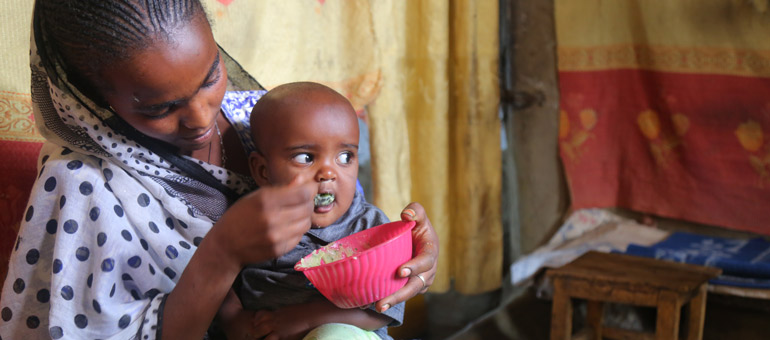How public-private engagement can transform food systems towards better nutrition.
Small and medium-sized enterprises (SMEs) shoulder responsibility for around 50% of the food production and 70-100% of food sales in sub-Saharan Africa for key foods such as fruits and vegetables, animal-source foods, and cereals and legumes. As Ethiopia’s population is swiftly shifting to more urban environments, so are food habits, with 83% of foods and beverages purchased in markets, as opposed to 47% in rural areas.
Many of these foods are purchased at kiosks and are cheap, convenient, vastly available but not always healthy. Affordable nutritious food options, especially for infants and children, remain limited. Nonetheless, these changing purchasing behaviours also offer unique opportunities to work with market actors to improve access to more nutritious food options for children.
Capitalising on this opportunity, the Global Alliance for Improved Nutrition (GAIN) is engaging public-private sector actors in Ethiopian urban and peri-urban areas to widen access and demand for nutritious and safe foods for children, with a focus on fortified infant porridges, fortified yoghurt, and eggs. This engagement recognises both the unique dietary needs of children and the potential for SME manufacturers and retailers to meet them.
Rural areas also fare to benefit from the development of nutritious food markets with rural distributors purchasing packaged products from urban wholesalers or caregivers directly buying from retailers.
This approach operationalises the Innocenti Framework on Food Systems for Children and Adolescents by focusing on the four determinants that influence the diets of children. The framework was developed by GAIN, UNICEF and other partners and is at the core of “Food Systems for Children and Adolescents”, a special issue of the international journal Global Food Security.
To stimulate food supply chain actors -GAIN is working in partnership with Ethiopian food processor, Faffa Foods SCO to develop and commercialise a single serving sized fortified infant porridge, based on the CODEX recommended maximum serving size,
for low-income to middle-income consumers. GAIN also delivered training to manufacturers, regulators, technical advisers and standard sector on complementary foods manufacturing, safety, and quality, the manual from the training is freely available online.
To support children’s external food environments, GAIN worked with the Ethiopian Standards Agency (ESA) to develop standards for formulated complementary foods, including fortified porridges, and fortified yoghurt. The draft standards are currently going through an approval process.

GAIN is engaging public-private sector actors in Ethiopian urban and peri-urban areas to increase the quality of children’s diets by widening access and demand for to nutritious, safe foods, with a focus on fortified infant porridges, fortified yoghurt and eggs. © GAIN
The final pillar of this approach is stimulating demand for readily available and affordable foods like eggs and fortified porridges. Complementing the Ministry of Health Social and Behaviour Change Communications approach, GAIN is promoting egg consumption among young children through community engagement, retail activation and mass communication.
This process hasn’t been without challenges. Public-private engagement is a growing area, with many government actors and civil society organisations unsure of the best way to justify supporting local food manufacturers, primarily SMEs. Standards also must be developed carefully to incentivise cost-effective, safe production and ultimately protect children.
Though this type of engagement is still in its early stages, the next steps are clear. Public and private sector actors have complementary skills and expertise, and more forums are needed to bring them together. Coordinated actions and collaboration across the food system, involving all market actors are essential and can support efforts to a sustainable path to improve children’s diets in Ethiopia.
*This work is taking place with thanks to the generous support of the Government of the Netherlands Ministry of Foreign Affairs and the Danish International Development Agency ( Ministry of Foreign Affairs of Denmark).